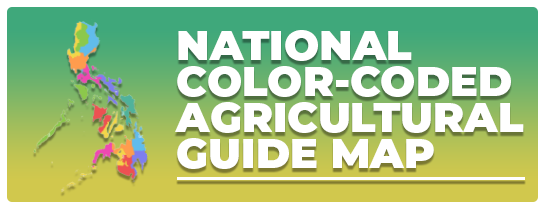A young farmer’s cacao-powered comeback
Posted by: RAFIS DA6 | Posted at: June 19, 2025
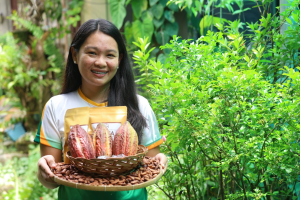
In the foothill barangay of Sagcup in Lambunao, Iloilo, the aroma of roasted cacao marks the steady progress of a small farm finding its way to productivity- driven by a young farmer’s practical vision and determination to support her community.
Christine Viola A. Gonzales, a 30-year-old agriculturist and educator, stands at the helm of LV Cacao, a growing cacao-based enterprise built not just on fertile soil, but on a strong commitment to community development and sustainable farming. Her journey through the Department of Agriculture’s Young Farmers Challenge (YFC) program sparked a significant transformation- for herself, her farm, and the people who now depend on both.
A graduate of BS Agriculture major in Crop Science, with a master’s degree in Plant Science from the West Visayas State University – College of Agriculture and Forestry, Christine is no stranger to the technical demands of farming. Before becoming a YFC awardee, she had already served nearly six years as a permanent instructor at the University of Antique – Hamtic Campus.
Yet, the heart of her journey lies in the farm her family established in 2018. But life took an unexpected turn when her father- then the farm manager- was diagnosed with multiple myeloma and became bedridden. Without leadership and labor, operations froze. Farm workers lost their livelihood, the cacao trees grew untended, and the dream began to wither.
Despite the setbacks, the farm now thrives 616 cacao trees spread over one hectare. It produces fermented beans and tablea, and has expanded its offering to include seedlings and vermicast, signaling a hopeful revival for both the business and the community.
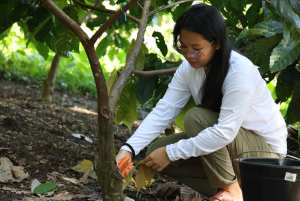
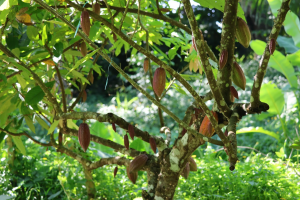
Christine’s return to the farm wasn’t merely an act of duty- it was a decision born both necessity and vision.
“When the farm stopped operating, I thought of the people in our community. How would they live? This farm was more than our livelihood, it supported others too,” she recalls.
She needed help to restart the operation. The YFC program offered hope. Initially hesitant, Christine eventually applied for the YFC provincial competition.
“I used to fear that I wasn’t good enough, that I would lose,” she admits. “But I told myself, this is not just about me anymore. This is about the people we can help.”
Winning the YFC grant not only allowed her to purchase farm tools and improved infrastructure, such as water systems, solar dryers, and fermentation boxes, but also reignited her confidence. More importantly, it gave her the chance to think bigger.
With the support of the regional grant, Christine began taking steps to strengthen her vision of zero-waste cacao farming. She plans to acquire a shredder for vermicomposting and a briquetting machine to process cacao pod waste into eco-friendly charcoal briquettes- enhancing the value-adding efforts for the Kataw Katuwang Community.
Compromising women, out-of-school youth, and unemployed residents of the area, the Kakaw Katuwang Community was Christine’s response to a troubling trend she observed: charcoal-making through destructive ‘kaingin’ or slash-and-burn methods.
“I saw how people turned to unsustainable ways to earn a living.” she says. “So I asked myself- why not turn cacao waste into a source of income instead?”
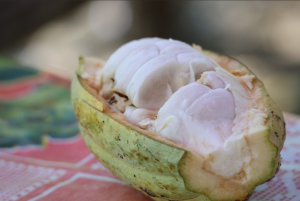
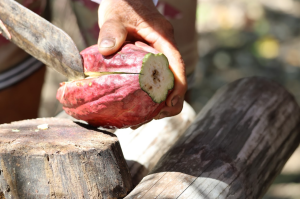
Christine has already laid out a clear model for community engagement. Once implemented, community members will take charge of briquette production under a 70-30 agreement- 70% of the income will go directly to the workers, while 30% will be allocated to Christine’s enterprise for equipment maintenance and marketing. Through this model, Christine is redefining what it means to be a young agripreneur- not just someone who builds a business, but someone who builds people along with it.
She is also exploring other value-added products like fossilized cacao leaves, which women in the community can turn into crafts such as lampshades and bags, further expanding the livelihood base. “I want every part of the cacao tree to contribute to someone’s life,” she says.
Christine’s story underscores how agriculture can be a key player in achieving food security- particularly when led by passionate, educated youth. Looking ahead, she envisions LV Cacao supporting contract growing for seedlings, offering tablea to local buyers, and supplying fermented beans. But beyond economic gain, she aims to turn the farm into a hub for education, environmental advocacy, and inclusive employment.
LV Cacao aims to become a certified learning for cacao farming and eventually develop into an agri-tourism spot in Iloilo. There are also plans to work with landowners to plant cacao on unused lands, offering seedlings and post-harvest support to benefit everyone involved. Part of the plan includes getting Good Agriculture Practices (GAP) certification to improve operations and reach more markets.
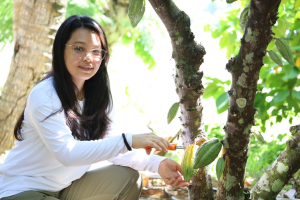
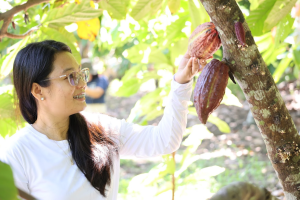
Christine’s voice now resonates far beyond her hillside farm. Her success has inspired not just her family and neighbors, but fellow youth may be doubting their place in agriculture.
“To young agripreneur: believe in yourself, the first step is the hardest, but every step after becomes easier. Don’t let keep you from blooming where God has planted you,” she says.
Her message is clear: agriculture is not a fallback- it’s a front line. It’s where innovation, sustainability, and community intersect. And with programs like YFC nurturing young visionaries, Christine believes the future of farming in the Philippines is not just hopeful- it is abundant.
From just one hectare of land, Christine has cultivated not only cacao trees but an ecosystem of change. She’s proving that with the right support, a farm can become more than a source of food- it can be a school, a sanctuary, and a springboard for community growth.
LV Cacao is not a recognized enterprise in Lambunao, celebrated by the local government and supported by national programs. And while its product may be sweet, its story is grounded in grit, resilience, and a powerful sense of purpose.
As Christine reflects on her journey, she knows the harvest is only just beginning. “Because of YFC, I was able to turn our cacao farm into a lifeline- for myself, my family, and our community. And through cacao, we are growing hope.”
Text by Myleen Subang and Photos by Myleen Subang & Cristine Lauresta/DA-RAFIS 6





